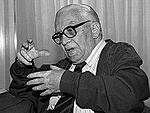José Antonio Nieves Conde facts for kids
Quick facts for kids
José Antonio Nieves Conde
|
|
|---|---|

José Antonio Nieves Conde
|
|
| Born | 22 December 1911 |
| Died | 14 September 2006 (aged 94) |
| Occupation | Film director |
| Years active | 1947 – 1977 |
José Antonio Nieves Conde (born December 22, 1911, in Segovia, Spain; died September 14, 2006) was a famous Spanish film director, journalist, and screenplay writer. He directed many movies, including Surcos (1951), Angustia (1947), and Balarrasa (1950).
Contents
About His Life
José Antonio Nieves Conde grew up in a large family. His father was in the military. From a young age, José Antonio was very interested in movies.
After finishing high school in Segovia, he started studying law in Madrid. During this time, he joined a political group called the Falange Española de las JONS. This group's ideas about society greatly influenced the films he later made.
When the Spanish Civil War began, he joined the Nationalist side as a volunteer. He became an Infantry Second Lieutenant. He did not finish his university studies in law.
After the war ended, he went back to Segovia. He worked in newspapers and on the radio there. Later, he moved back to Madrid. He became a movie critic for a newspaper called Pueblo. Between 1939 and 1942, he also worked as an editor for a film magazine called Primer Plano.
José Antonio was friends with other film professionals like Rafael Gil. In 1941, he started working in movies professionally. He became an assistant director for Rafael Gil. He helped Gil make five movies between 1941 and 1946. These films included Viaje sin destino (1942) and Tierra sedienta (1945).
Around 1942, he left his jobs at Primer Plano and Pueblo. He then focused completely on his film career.
His Film Career
José Antonio Nieves Conde directed his first movie in 1946. It was called Senda ignorada. This film was a gangster movie set in the United States.
Next, he directed Angustia in 1947. This was another crime film. It starred actors like Rafael Bardem and Julia Caba Alba. The movie was considered very important for the country. In 1949, he directed Llegada la noche. The story for this film was written by Carlos Blanco.
In 1950, he directed Balarrasa. The story was written by Vicente Escrivá. Famous actors like Fernando Fernán Gómez and María Rosa Salgado were in it. This movie was also seen as very important for Spain. It became his first big success, both with audiences and financially. In the same year, he also helped direct Jack el negro with Julien Duvivier.
His most famous film was Surcos, made in 1951. Many people consider this one of the greatest Spanish films ever made. It showed a clear social message. The story was written by Natividad Zaro and Gonzalo Torrente Ballester. The main actors were Luis Peña and María Asquerino.
Surcos caused some discussion because it showed real-life problems. It talked about poverty, the black market, and people moving from the countryside to cities. These were topics that people usually didn't talk about openly in movies at that time. Because of this, the ending of the film had to be changed before it could be shown. Even though it won national awards, it did not earn a lot of money.
Filmography
- Unknown Path (1946)
- Anguish (1947)
- Night Arrival (1949)
- Black Jack (1950) a.k.a. Captain Blackjack
- Balarrasa (1950) a.k.a. Reckless
- Surcos (1951) a.k.a. Furrows
- Devil's Roundup (1952)
- Rebellion (1954) Duell der Herzen
- The Red Fish (1955)
- We're All Necessary (1956)
- The Legion of Silence 1956)
- The Tenant (1957) a.k.a. The Tenant
- Don Lucio y el hermano pío (1960)
- Prohibido enamorarse (1961)
- Por Tierras de las Siete Villas (1963)
- El Sonido prehistórico (1964) Sound from a Million Years Ago
- El Diablo también llora (1965)
- Cotolay (1966)
- Historia de una traición (1971) a.k.a. The Great Swindle
- Las Señoritas de mala compañía (1971) a.k.a. Marta
- The Marriage Revolution (1974)
- Más allá del deseo (1976)
- Volvoreta (1976)
- Casa Manchada (1977) a.k.a. Impossible Love
See also
 In Spanish: José Antonio Nieves Conde para niños
In Spanish: José Antonio Nieves Conde para niños

